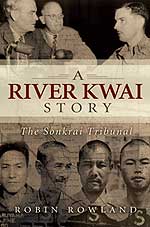I wanted to keep a blog/diary on how the book is going, but decided not to start until the first very rough draft was complete.
So for this first week:
Was at a conference, Sunday, Monday and Tuesday. Thursday and Friday off to recharge brain batteries after special projects at work for U.S. election and the 60th anniversary of the Second World War Italian campaign. So got some work, not much done, on the revisons.
The serendipity coincidence connection came through this week. The family of a U.S. Marine who was in Changi Jail in Sinapore are sending me excerpts from his diary. And it turns out that one of the heroes in this book, Lt. Col. Andy Dillon, of the British Indian Army, the man who helped keep many alive in the jungles of Thailand, became the protector of the few Americans in Changi.
Also the Imperial War Museum has found some drawings, stored away and not seen in decades and so I hope to use some of them in the book.
Iris Chang
November 12, 2004 12:18 a.m.
I found out late tonight that Iris Chang, author of The Rape of Nanking had been found dead in California of an apparent self-inflicted gunshot wound. You can read the CBC.ca story.
November 11 was what I call a do-nothing day, when I recharge my brain batteries, so I wasn't checking the news as much as I would normally. So I actually found out about this story from the Boing Boing blog.There are already blogspace rumours that Chang may not have committed suicide, but that is clearly a bit of net-conspiracy-paranoia.
I can't see any motive that would connect to her work on the Bataan Death March; work that I know from personal experience can be incredibly depressing and energy draining.Since I have been working on my own book on prisoners of war for the past four years, not to mention having lived with the family burden of being the son of POW on the River Kwai, I know that this work can bring on depression that can sometimes be overwhelming. It is not only listening to what those men went through, but also reading the filing cabinets full of the documents I have collected over the past few years, documents that not only show the absolute cruelty of those dehumanizing years, but how incompetence, petty political jealousy, bad planning and willful ignorance made everything worse on the infamous Burma Thailand Railway of Death where thousands died.
Here I must note something that has not been said in the news stories on Iris Chang. The evidence at the Tokyo War Crimes trial from 1946 to 1948, showed the Japan declared anyone fighting their occupation of China to be a bandit, an "unlawful combatant." Japan told the world that it would follow the Geneva Convention, even though it had not ratified it, and then totally disregarded it.
And now the man who told the United States it could disregard the Geneva Convention, Alberto Gonzales, is nominated to be the next Attorney General of the United States.
The death of Iris Chang is a great loss to history and literature, and, though I am not religious, I must say, may she rest in peace.
Update: November 13. The American Mind Blog also comments on the overwhelming nature of this type of work.
Canadians:




